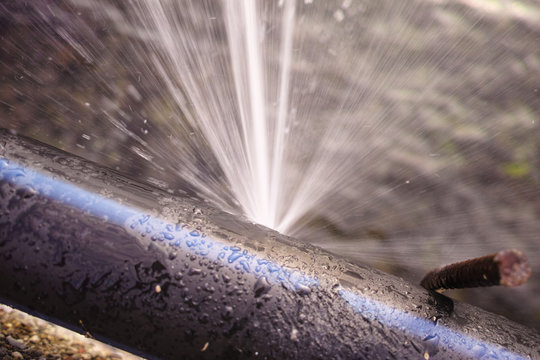
Your main water line is the pipe that carries water from the city’s water distribution line into the street and brings it into your home, says Rent Pros team. Also known as the cold water supply line or water service line, this line is mostly underground and runs from the edge of the street to your building.
The main water line connects to the municipal water supply at the boundary of your property. It typically enters your home through the basement or mechanical room. On the main water line is where you find your water metering device and main water shutoff valve.
After entering the house, your main water line branches into hot and cold water pipe paths before splitting into smaller pipes that supply the plumbing fixtures and appliances in your home. Problems with the main water line can impede or cut off your water supply.
Common main water line issues in homes
- Low water pressure
Low water pressure in your home may come from the city’s water supply lines or your main water line. If the issue is not from the city, it is possible that your main water line is clogged with debris or mineral deposits.
- Leaks
Leaks in your main water line do not always show up inside your home or on the ground above the location of the line. A broken water line may secretly discharge water into the surrounding soil or the base of your building.
- Burst pipe
This can happen if the water pressure is too high or the pipe is severely corroded. Heavy traffic above the location of your main water line can also cause the pipe to fracture. Cold weather can freeze a water line and cause it to rupture.
If you think your water line is damaged, there are only two ways to fix it. You can repair the water line (if the problem is not severe) or replace it. What are the signs that your main water line is in trouble and needs urgent attention?
5 signs that you need main water line repair
- Discolored water
If your water has a brownish or yellowish color, it means there is rust, corrosion, or mineral buildup inside your pipes. It can also mean that your main water line is broken, and soil is finding its way into the water supply via a leak. To solve this problem, you have to find the root of the problem and deal with it. Remember that a leaky underground pipe can discharge water into the foundation of your building and weaken it.
- Low water pressure
A sudden drop in water pressure could mean that your main water line is damaged. If the problem is only evident in your home and not your neighbor’s houses, it is likely from your main water line. Your water line may have a major leak or be clogged with debris. A professional plumber can help you find the cause of the problem.
- Sudden spikes in your water bill
If your water bill is going up, but the water company has not raised its rates, and your home’s water usage pattern has not changed, there is a good chance that your main water line is leaking. The spike in your water bill may be due to a hidden leak secretly discharging water into the ground. To find out if the main water line is leaking, ask your plumber to do some checks.
- Wet or lush patches on your lawn
A soggy patch of soil in your lawn is a sign that your main water line is leaking water into the soil, especially if the surrounding areas are dry. Sometimes, you will not see any signs of wetness on the ground, but you may find that the grass in one section of your lawn is greener than the rest. This happens when that patch of grass is getting extra water from a leaky underground pipe.
- Old and fragile pipes
If your water line is made of materials like lead, iron, or galvanized steel, it will not only be prone to rust/corrosion, but the materials can contaminate your water supply. Lead and galvanized steel water pipes have been banned for use in homes since the 1980s, but they can still be found in some old homes. If yours is one of those old homes with these toxic materials, it is time to replace your main water line.
What should you do if your water line is damaged and leaking? If a broken pipe is gushing water into your home or yard, the first step is to turn off the water supply at the main water shutoff valve. If you don’t have this type of emergency, proceed to step two.
Next, you want to call a trustworthy plumber with experience in water line problem diagnosis and repair. That plumber should have the tools and expertise to check your water line and entire plumbing to determine the cause and extent of the problem and how to fix it.

